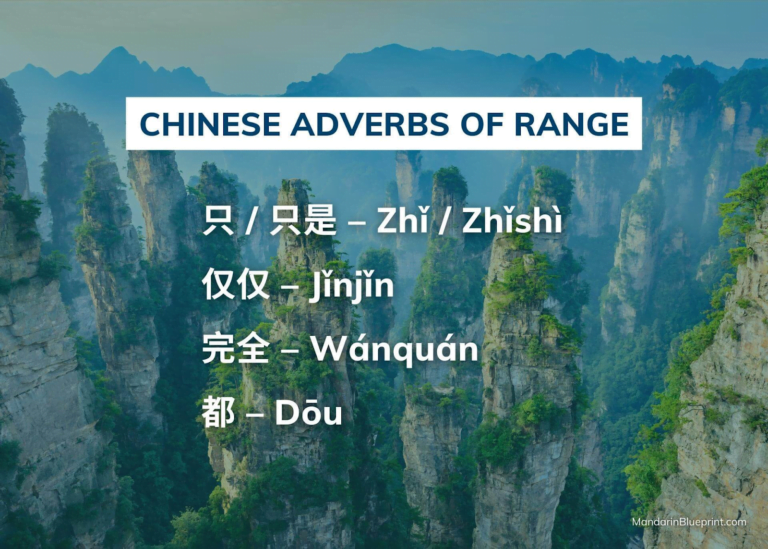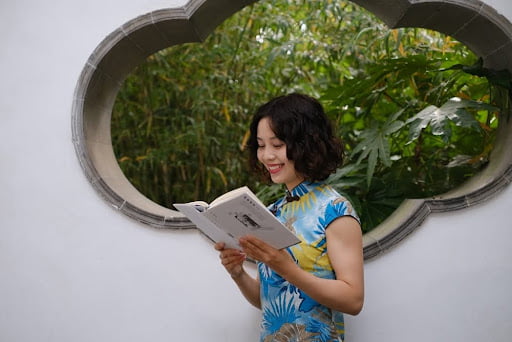Your Guide to Chinese Adverbs of Range

In exploring the fascinating world of Chinese adverbs and their unique functions, it’s essential to understand their role in enhancing the depth of a sentence. While a sentence can stand grammatically correct without them, Chinese adverbs inject nuanced meanings and fine-tune the message conveyed.
Specifically, Chinese adverbs of range play a pivotal role in defining the extent and context of actions. For instance, consider the simple yet complete statement, “I care about my son.” The introduction of a Chinese adverb of range, such as “only”, significantly alters its meaning. This adverb narrows down the focus, indicating that the care is exclusively directed towards the son, to the exclusion of others.
This subtle but powerful shift exemplifies the impact Chinese adverbs have in transforming the essence of a sentence.
Understanding these adverbs provides a window into the complexities and beauty of Mandarin’s unique grammatical composition. Let’s break down some common Chinese adverbs of range.

只 / 只是 – Zhǐ / Zhǐshì
The Chinese character 只 (zhǐ) and the phrase 只是 (zhǐshì) are used to limit or specify the scope of an action or situation, similar to the English words “only” or “just.” They add a sense of restriction or exclusivity to the context in which they’re used.
When the Chinese adverb of range 只 (zhǐ) precedes a verb, it confines the action to a particular noun or situation. Take, for instance, the sentence “我身体没什么大问题,只是有点累” (Wǒ shēntǐ méi shénme dà wèntí, zhǐshì yǒudiǎn lèi), which translates to “I don’t have any major health issues, I am just a bit tired.”
Here, the adverb 只 (zhǐ), placed before “有点累” (yǒudiǎn lèi) or “a bit tired,” plays a crucial role. It highlights that the speaker’s overall physical condition is satisfactory, with the only concern being a sense of tiredness. So, 只 (zhǐ) serves to narrow down the scope of the discussion to mere tiredness, excluding other potential health problems.
The phrase 只是 (zhǐshì) is used in a similar manner but is slightly more explicit. It translates to “only” or “just” and is often used to clarify or emphasize the limited nature of a situation. For example, “只是一个小问题” (zhǐshì yīgè xiǎo wèntí) means “it’s just a small issue” and highlights that the problem is not significant or serious.
Both 只 (zhǐ) and 只是 (zhǐshì) are useful linguistic tools in Chinese to specify or limit the scope of an action, condition, or situation, providing clarity and emphasis in communication.
Related Reading: Despite in Chinese With 虽然……但是
仅仅 – Jǐnjǐn
The Chinese adverb “仅仅” (jǐnjǐn) is used to convey the meaning of “only” or “just,” particularly in the sense of “not that much” or “a small amount.” It’s often used to emphasize the limited nature of something or to indicate a relatively low quantity or degree.
For example, if you say, “这部电影时长仅仅75分钟” (Zhèbù diànyǐng shícháng jǐnjǐn 75 fēnzhōng), it means “The duration of this movie is only 75 minutes.” In this context, “仅仅” (jǐnjǐn) is used to emphasize that the movie’s length is quite short, specifically 75 minutes. It conveys the idea that the movie’s duration is not lengthy or excessive but rather quite concise.
This adverb is valuable in Chinese communication when you want to highlight that something has a minimal or modest quantity or degree, falling short of a larger expectation. It adds precision and clarity to your statements, allowing you to convey the exact degree or amount of something in a natural way.
Related Reading: Only in Chinese With 只有……才- Zhǐyǒu……cái
完全 – Wánquán

The Chinese adverb “完全” (wánquán) is a versatile and valuable term used to express the idea of “completely” or “absolutely.” It serves to expand the scope of the subject under discussion and emphasize the statement being made.
When you use “完全” (wánquán) in a sentence, it conveys the notion of totality or thoroughness. For instance, if someone says to you, “你完全做错了” (Nǐ wánquán zuòcuò le), it can mean two things:
- You did everything wrong: In this context, “完全” (wánquán) implies that the person believes you made multiple mistakes across the board, not just a single error.
- You did something totally wrong: Here, “完全” (wánquán) emphasizes the seriousness of the mistake, indicating that it wasn’t a minor error but a significant one.
“完全” (wánquán) is a versatile Chinese adverb that allows you to provide clarity and precision in your statements. Whether you want to stress the completeness or thoroughness of an action or highlight the gravity of a mistake, this term proves useful in various contexts of communication in Chinese.
Related Reading: The Definitive Guide to Chinese Proverbs, Sayings, and Quotes
都 – Dōu
The adverb “都” (dōu) is a great word but it can sometimes be challenging for English speakers to fully understand. It serves several purposes in Mandarin and may appear redundant in certain contexts when translated to English.
In sentences like “他每天都在学习中文” (Tā měitiān dōu zài xuéxí zhōngwén), which means “He studies Chinese every day,” the inclusion of “都” alongside “每天” (měitiān, meaning “every day”) emphasizes the regularity of the action. It signifies that the person is consistently studying Chinese each day. Where “都” appears alongside “每” (měi), both words convey the idea of “every.” In English, this redundancy might seem unnecessary.
However, in Chinese, the inclusion of “都” emphasizes the frequency and consistency of the action, indicating that learning Chinese is a regular, ongoing activity for the person. It reinforces the idea that the individual is indeed studying Chinese every single day.
“都” can also be used to specify a range, as in “对你来说,周一到周五都方便,是吧?” (Duì nǐ lái shuō, zhōuyī dào zhōuwǔ dōu fāngbiàn, shì ba?), which translates to “For you, Monday to Friday, all days are convenient, right?” In this context, “都” indicates that every day within the range (from Monday to Friday) is convenient.
“都” (dōu) serves to emphasize regularity, consistency, and inclusivity in different contexts. While it may seem redundant when directly translated into English, it adds nuance and emphasis to Mandarin sentences, making them more precise and clear.
Add Flavor to Your Sentences with Chinese Adverbs of Range
The use of Chinese adverbs, and particularly adverbs of range like 只 (zhǐ), demonstrates the richness and precision of the Chinese language. These adverbs offer speakers the ability to fine-tune their sentences, adding layers of meaning and clarity that go beyond the basic structure of a statement.
The power of these adverbs lies in their ability to transform a general statement into a nuanced expression, accurately conveying the speaker’s intent, emotions, and the subtleties of their thoughts. Understanding and effectively using Chinese adverbs of range can significantly enhance your proficiency in the language, opening up new avenues for expressive and precise communication.
Whether you are a language enthusiast or a learner looking to deepen your understanding of Chinese, recognizing the role and impact of these adverbs is an essential step in mastering the language’s unique expressive capabilities. These linguistic tools dramatically improve the palette for your Mandarin conversations.
But learning is just the beginning. To truly master Mandarin, you need to apply your knowledge in practical ways. So, if you’re ready to supercharge your Mandarin learning journey, here’s your chance.
Are you struggling to make your Mandarin sentences more expressive and meaningful? Do you want to go beyond basic conversations and truly master the language? If so, keep reading.
Chinese adverbs are the key to unlocking your linguistic potential. They add depth, nuance, and flavor to your sentences, making your Mandarin conversations truly engaging. Imagine impressing your friends, colleagues, and even native speakers with your fluency and command of the language.
Ready to supercharge your Mandarin learning journey? It’s time to take the first step. Complete the free Mandarin Fluency Scorecard and gain valuable insights into your current language skills. Identify your weaknesses, discover your barriers to fluency, and receive a customized guide to help you reach your goals.
Don’t miss this opportunity to accelerate your Mandarin proficiency. It’s quick, easy, and completely free—taking less than 60 seconds of your time.
Embrace the power of adverbs and unlock your full potential in Mandarin Chinese. Start your journey to fluency today!








